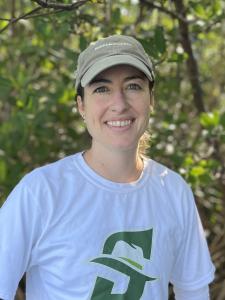Corie Charpentier
Assistant Professor of Biology
Corie Charpentier, PhD, is a marine biologist who pursues research in the ecology and physiology of coastal animals. She is enthusiastic about science education and strives to provide opportunities for Stetson students and the community to engage with marine life, biology, and the scientific process.
- EOAS, Postdoctoral Fellow, Rutgers University
- PhD, Marine Biosciences, University of Delaware
- BS, Marine Science, Eckerd College

Biography
Corie Charpentier, PhD, grew up exploring the rocky shores of New England and discovered her passion for marine science at an early age. Since, she completed a BS in Marine Science from Eckerd College and a PhD in Marine Biosciences from the University of Delaware. During her PhD, Charpentier studied predator-induced defenses in crustacean zooplankton. She also contributed to research on the visual physiology of krill during Arctic polar night. She then worked as a postdoctoral fellow at Rutgers University, where she investigated the impact of artificial light on coastal larvae in New Jersey and contributed to the investigation of new technologies for efficient study of Antarctic trophic ecology.
During her time as a PhD student and postdoctoral fellow, Charpentier also consistently engaged in environmental outreach and undergraduate mentorship. Just prior to her arrival at Stetson, she taught biology and marine science courses at Ransom Everglades School. Charpentier aims to share her for passion for marine science and the natural world through teaching, mentorship, and research at Stetson.
More About Corie Charpentier
Areas of Expertise
- Marine Science
- Invertebrate Biology
- Larval Ecology
- Environmental Physiology
Course Sampling
- Marine Ecology
- Environmental Physiology of Marine Organisms
- Aquatic and Marine Biology
- Introductory Biology I, II
- Senior Research I, II
- Interactions between marine animals and their environment
- Impacts of artificial light on coastal animals
- Role of larval settlement in shoreline restoration
- Phenotypic plasticity in behavior and physiology
- Predator-prey interactions in coastal ecosystems
- Charpentier, C.L., Barnes, D.K., Gidzinski, S-L., Jones, L., and Fuchs, H.L. (2025) Behavioral responses to artificial sky glow vary in coastal invertebrate larvae. Mar. Environ. Res. 210: 107326.
- Sussan, T.T., and Charpentier, C.L. (2024) Conditions that promote oyster settlement coincide with areas of high boating activity in a developed coastal habitat. J. Exp. Mar. Biol. Ecol. 572: 151989.
- Cohen, J.H., Last, K.S., Charpentier, C.L., Cottier, F., Daase, M., Hobbs, L.J., Johnsen, G., and Berge, J. (2021) Arctic twilight entrains visual sensitivity and behavioral rhythms in krill. PLOS Biol. 19: e3001413.
- Sabal, M.C., Boyce M.S., Charpentier, C.L., Furey, N.B., Luhring, T.M., Martin, H.W., Melnychuk, M.C., Srygley, R.B., Wagner, C.M., Wirsing, A.J., Ydenberg, R.C., and Palkovacs, E.P. (2021) Predation landscapes alter prey migration in a human-dominated world. Trends Ecol. Evol. 36: 737-749.
- Charpentier, C.L., Angell, C.S., Duffy, P.I., and Cohen, J.H. (2020) Natural variations in estuarine fish, fish kairomones, and zooplankton photo behavior. Marine Freshw. Behav. Physiol. 52: 265-282.
- Charpentier, C.L and Cohen, J. H. (2018) Kairomones from an estuarine fish increase visual sensitivity in brine shrimp (Artemia Franciscana) from Great Salt Lake, Utah, USA. J. Comp. Physiol. A. 204: 197-208.
- Charpentier, CL, Wright, A.J., and Cohen, J.H. (2017) Fish kairomones induce spine elongation and reduce predation in marine crab larvae. Ecology 98: 1989-1995.
- Charpentier, C.L. and Cohen, J.H. (2016) Acidification and gamma-aminobutyric acid independently alter kairomone-induced behaviour. R. Soc. Open Sci. 3: 160311.
- Charpentier, C.L. and Cohen, J.H. (2015) Chemical cues from fish heighten visual sensitivity in larval crabs through changes in photoreceptor structure and function. J. Exp. Biol. 218: 3381-3390.